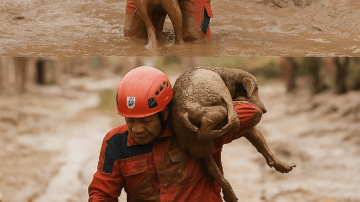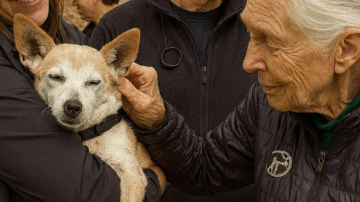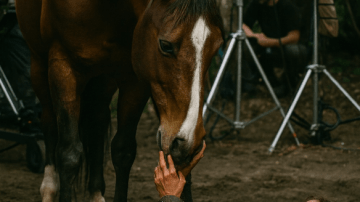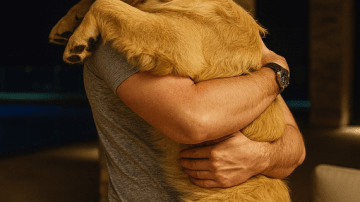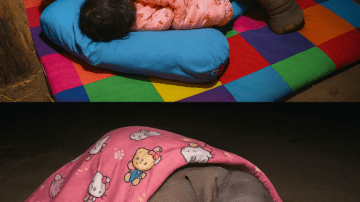No dog deserves such cruelty.

For four long years, this was all Ash had known—the cold, unyielding walls of a rusted iron cage. He lived in a filthy corner, on ground caked with dirt, with no comfort, no kindness. His matted coat clung to his frail frame like a shroud, his eyes reflecting a deep, haunted fear of the outside world.
It was a neighbor who finally raised the alarm. Shocked and horrified by the state of the dog, they called for help. A rescuer arrived, rushing to the scene.
“This is worse than I imagined,” he murmured, his chest tightening. The stench hit immediately—rancid, foul, suffocating. Flies swarmed around the cage. Inside, the dog shrank into a corner, trembling, his gray fur thick with filth and knots so dense they had hardened into a crust.
He looked less like a dog and more like a ghost of one.
The neighbor, tears in their eyes, whispered, “He’s been neglected all these years. Left to survive however he could.”
The rescuer knelt, speaking softly through the bars. “It’s okay, little one. I’m here now.”
The dog didn’t move. Was this another threat, or the first glimpse of hope? Exhaustion hung on him like a shadow.

Then, the owner appeared, disheveled from sleep. He demanded money, claiming he had “invested” in feeding the animal. The rescuer stood firm. “This dog deserves better than this. You cannot abuse a living being and then sell him when you’re done.”
The neighbors gathered, voicing their outrage. Under their judgmental stares, the owner relented at last. “Take him. I don’t care anymore.”
But Ash didn’t rush out. For him, the cage was not just a prison—it was the only world he had ever known. When the rescuer opened the door, Ash hesitated. His paw lifted, then retreated. Fear chained him as tightly as the bars.
“Come on,” the rescuer whispered. “We’ll leave together.”
After coaxing, gentle pulling, and patient waiting, Ash finally stepped outside. His body quaked, his spirit unsure, but he was free.
It was too late to reach a hospital, so they brought him to the rescue shelter. His first night of freedom began not with celebration, but with a shave. Years of neglect had left his fur a hardened shell. Carefully, scissors began snipping, releasing clumps of matted hair. Underneath lay thin, fragile skin, scarred from years of hardship.
For over an hour, they worked. Slowly, Ash’s body grew lighter, freer. When at last his head was clear, he lifted it, and for the first time, his tired eyes met the rescuer’s. Gratitude glimmered faintly in them, like the first light of dawn. A faint smile tugged at his mouth.

“You’re safe now,” the rescuer whispered, offering him water. Ash drank desperately, the bowl clouding with dirt. The rescuer’s voice broke. “You’ve suffered so much… but this is a new beginning.”
They continued shaving. When they reached his hind legs, they froze. Beneath the fur lay wounds—severe injuries requiring urgent care. The rescuer’s heart ached, but he didn’t stop. Carefully, he cleaned and trimmed until every hidden wound was revealed.
Four hours passed. Only his ears and front paws remained untouched, but already Ash was transformed. He sat quietly, as if he understood this painful ritual was the start of healing. That night, though still thin, cold, and wounded, he lay on a soft bed for the first time in years.
The rescuer gave him a name: Ash, for his gray coat and for the way he would rise again, like a phoenix from ashes.
The next morning, Ash was taken to the veterinary hospital. Doctors conducted a full exam. He had a fever, severe infections, and wounds that needed daily care. They cleaned him thoroughly, gave him fluids and injections, and dressed his injuries. Despite the pain, Ash remained silent, his quiet resilience moving everyone who saw him.
He was admitted for daily treatments. Bandages were changed, medicine given. The rescuer, overwhelmed by what Ash had endured, vowed never to leave his side.
X-rays revealed more: soft tissue inflammation in his swollen leg, likely worsened by years in a damp, filthy cage. His pelvis showed signs of past trauma, misaligned from rough handling or brutal neglect. Yet his bones were strong enough to heal—if only he received care in time.

By day six, Ash began to improve. The rescuer offered food by hand. Slowly, cautiously, Ash stood and took it. Such a simple act—trusting enough to eat—was monumental.
“It must have taken all his courage to do that,” the rescuer thought, tears in his eyes.
Each small moment marked the return of Ash’s spirit.
Weeks passed. His wounds closed, bandages came off, and his paws—once raw—began to heal. Finally, he was discharged, stable and ready to continue recovery at the shelter.
From there, progress was steady. With good food, gentle care, and patience, Ash’s body grew strong. His coat, once gray and filthy, turned glossy and clean. Though a shadow of caution still lingered in his eyes, trust bloomed slowly, like spring after a long winter.
Six months after rescue, Ash was unrecognizable. The broken prisoner of a rusted cage had become a beautiful, resilient dog. And then, his true miracle came—he found a forever home.
His new family loved him, cherished him, gave him the life he had always deserved.
We cannot save them all. But for the ones we do, like Ash, it means everything.

